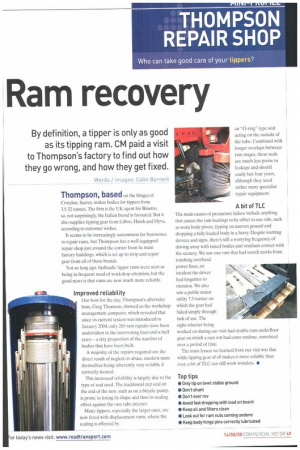Ram recovery
Page 49

If you've noticed an error in this article please click here to report it so we can fix it.
By definition, a tipper is only as good as its tipping ram. CM paid a visit to Thompson's factory to find out how they go wrong, and how they get fixed.
Words / Images: Colin Barnett Thompson, based on the fringes of Croydon, Surrey, makes bodies for tippers from 3.5-32 tonnes. The firm is the UK agent for Binotto, so, not surprisingly, the Italian brand is favoured. But it also supplies tipping gear from Edbro, Harsh and Hyva, according to customer wishes.
It seems to be increasingly uncommon for businesses to repair rams. but Thompson has a well-equipped repair shop just around the corner from its main factory buildings, which is set up to strip and repair gear from all of these brands.
Not so long ago, hydraulic tipper rams were seen as being in frequent need of workshop attention, but the good news is that rams are now much more reliable.
Improved reliability Our host for the day, Thompson's aftersalcs boss, Greg Thomson. showed us the workshop management computer, which revealed that since its current system was introduced in January 2004, only 265 ram repairs have been undertaken in the intervening four-and-a-half years — a tiny proportion of the number of bodies that have been built.
A majority of the repairs required are the direct result of neglect or abuse, modern rams themselves being inherently very reliable if correctly treated.
This increased reliability is largely due to the type of seal used. The traditional cup seal on the end of the ram, such as on a bicycle pump, is prone to losing its shape and thus its sealing effect against the ram tube. interior.
Many tippers, especially the larger ones, are now fitted with displacement rams, where the sealing is effected by an "0-ring" type seal acting on the outside of the tube. Combined with longer overlaps between ram stages, these seals are much less prone to leakage and should easily last four years, although they need rather more specialist repair equipment.
A bit of TLC The main causes of premature failure include anything that causes the ram loadings to be offset to one side, such as worn body pivots, tipping on uneven ground and dropping a fully loaded body in a hurry. Despite warning devices and signs, there's still a worrying frequency of driving away with raised bodies and resultant contact with the scenery. We saw one ram that had scorch marks from touching overhead power lines, an incident the driver had forgotten to mention. We also saw a public sector utility 7.5-tonner on which the gear had failed simply through lack of use. The eight-wheeler being worked on during our visit had double-ram underfloor gear on which a ram nut had come undone, unnoticed over a period of time.
The main lesson we learned from our visit was that while tipping gear of all makes is more reliable than ever, a bit of TLC can still work wonders. •
































































































































































